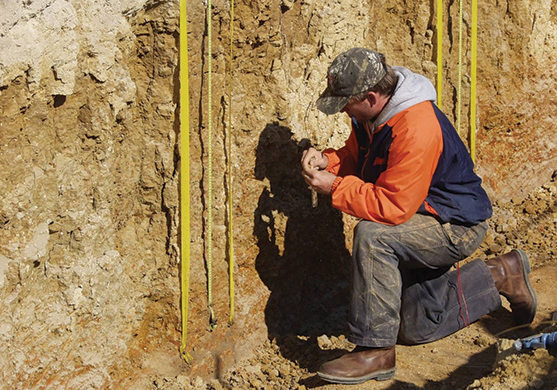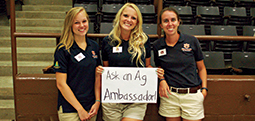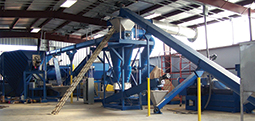| Current Issue | Past Issues | Subscribe | Ag Homepage |

Agronomy and Soils
Here From the Beginning
Protecting Alabama’s soil and water resources and finding better ways to grow and manage crops have been priorities since Auburn University’s earliest days as an agricultural college. Today the Auburn University Department of Agronomy and Soils continues to honor its commitment to helping farmers and landowners, but it is also emerging as a leader in environmental science, an area of study that affects every man, woman and child in the state and beyond.
Agronomic and soil studies were among the first projects tackled as far back as the 1860s by agricultural scientists at what was to become Auburn University. It was not until 1911, however, when the Alabama Legislature set aside funds for cooperative field experiments, that a structure began to develop for the future department. By 1916, agronomy was listed as a teaching unit in what was then the College of Agricultural Sciences, and it became an official department in 1919.
During those early years, faculty focused much of their work on fertilizer management research that helped establish methods for testing fertilizers and soils. The soils program then expanded to include work in the areas of classification and mineralogy, physics and productivity.
Crop research also was a principal focus from the department’s beginning and, through the years, Auburn built strong programs in the areas of plant breeding and crop management and production. During the 1960s, the department further expanded it programs—and reputation—in turfgrass and weed science.
Areas of Excellence
“Turf, weed and soil/environmental science are the areas that our department is probably best known for,” says Joe Touchton, department head and professor of soil science who joined the Auburn faculty in 1980. Conservation tillage and biofuel production research have also been areas of particular strength for his department.
In more recent years the department has established a strong and growing reputation in environmental sciences, which Touchton says touches on a wide array of issues, from waste management to water quality to nutrient recommendations to conservation tillage.
With these many areas of strength come a number of opportunities for undergraduate and graduate students in agronomy and soils, who can pick options ranging from traditional agronomic production and science to turfgrass management and golf course construction to environmental sciences, which is now a multidisciplinary undergraduate major offered to students campus-wide but administered by Wes Wood, a faculty member in the Department of Agronomy and Soils.
In his own 30-plus years at Auburn, Touchton has seen lots of changes in agriculture and academia and says his department has always been flexible enough to respond to the trends in agriculture and society. A prime example is the department’s leadership in establishing online and distance education degree and certification options at Auburn, which expand opportunities for nontraditional students to advance their educations in the sciences.
Partners and the Future
According to Touchton, the department is fortunate to have a productive and cooperative relationship with the U.S. Department of Agriculture’s National Soil Dynamics Laboratory, which is located in Auburn. It is also home to one of Auburn’s most valuable services—the Auburn University Soil Testing Laboratory, which helps everyone from farmers to homeowners be better stewards of their land.
To keep up with the needs of today and tomorrow, Touchton says further growth will be needed in Auburn’s plant breeding, turf and environmental soil sciences programs, all of which he says are vital to the future of food and fiber production and environmental protection. “Forage production is an area that we need major growth in because we have a lot of cows in Alabama,” he adds.
While there are still unmet needs and probably new ones on the horizon, Touchton feels the Department of Agronomy and Soils is poised to address those needs and, with agricultural crop prices rising and the need for effective environmental science growing, the department’s role at Auburn is perhaps more vital than ever before.
“The future for our department looks great,” says Touchton.
Environmental Science—A Growing Major
The Auburn University environmental science program, an interdisciplinary major administered through the College of Agriculture’s Department of Agronomy and Soils in partnership with Auburn’s Samuel Ginn College of Engineering and College of Sciences and Mathematics, has become a magnet for students interested in careers ranging from environmental consulting, law, planning, education and management to soil science, air and water quality and waste management.
With a current enrollment of 53 students, this major utilizes faculty in all three colleges to provide students a broad-based general education; a solid background in mathematics, physical science and biological science; and a deeper understanding of the social and political issues that affect the environment and public interest, health and safety.
Students can select a general environmental science track or specialize their degree through professional tracks that emphasize the environmental applications of biological science, physical science, soil science or engineering science.
For more information on the degree contact Wes Wood, environmental science major coordinator, at 334-844-3997 or woodwes@auburn.edu.
September 2012
Ag Illustrated

Cultivating the Cream of the Crop
College of Ag’s Best Assets—Its People by







